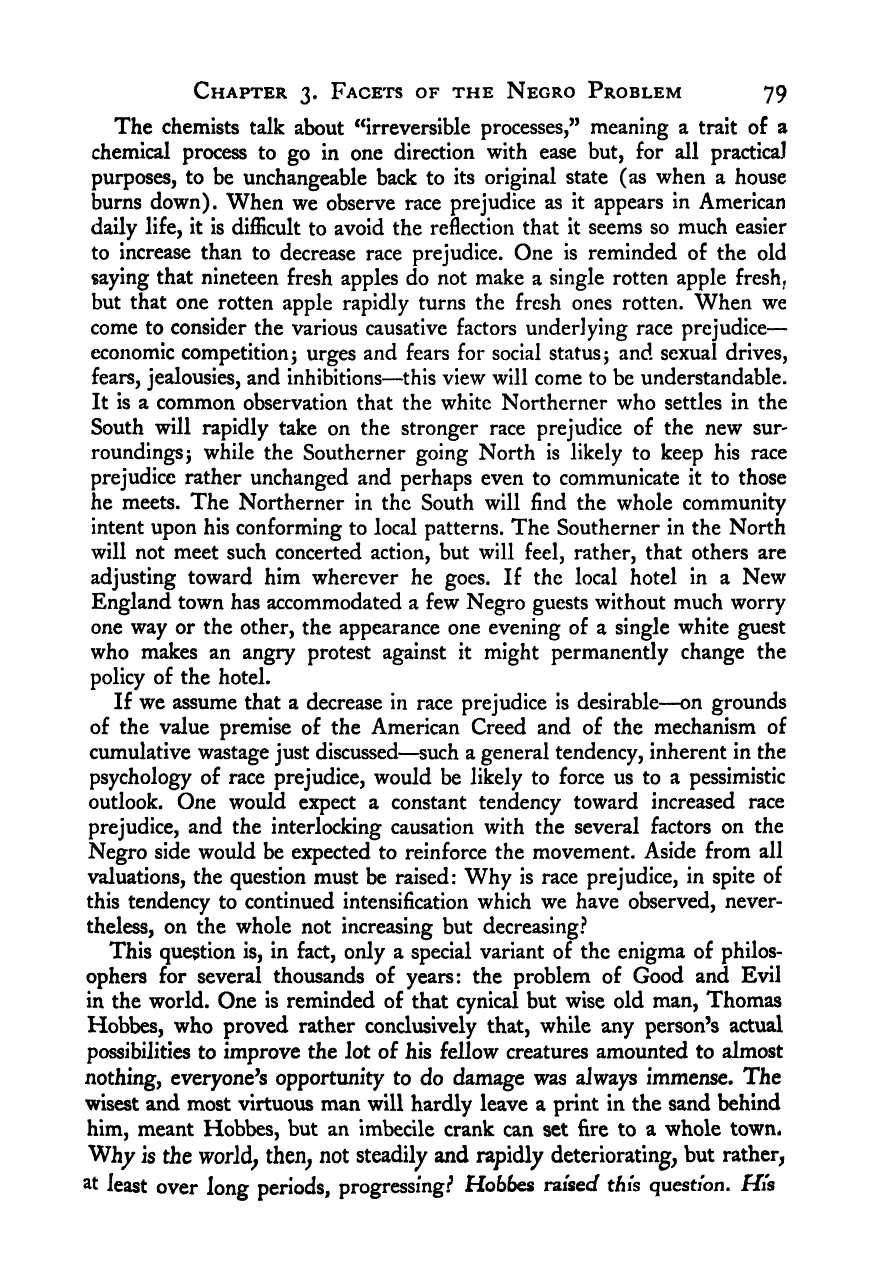Note: Gunnar Myrdal died in 1987, less than 70 years ago. Therefore, this work is protected by copyright, restricting your legal rights to reproduce it. However, you are welcome to view it on screen, as you do now. Read more about copyright.
Full resolution (TIFF) - On this page / på denna sida - I. The Approach - 3. Facets of the Negro Problem - 8. A Theory of Democracy

<< prev. page << föreg. sida << >> nästa sida >> next page >>
Below is the raw OCR text
from the above scanned image.
Do you see an error? Proofread the page now!
Här nedan syns maskintolkade texten från faksimilbilden ovan.
Ser du något fel? Korrekturläs sidan nu!
This page has never been proofread. / Denna sida har aldrig korrekturlästs.
Chapter 3. Facets of the Negro Problem 79
The chemists talk about ^irreversible processes,” meaning a trait of a
chemical process to go in one direction with ease but, for all practical
purposes, to be unchangeable back to its original state (as when a house
burns down). When we observe race prejudice as it appears in American
daily life, it is difficult to avoid the reflection that it seems so much easier
to increase than to decrease race prejudice. One is reminded of the old
saying that nineteen fresh apples do not make a single rotten apple fresh^
but that one rotten apple rapidly turns the fresh ones rotten. When we
come to consider the various causative factors underlying race prejudice
economic competition; urges and fears for social status; and sexual drives,
fears, jealousies, and inhibitions—this view will come to be understandable.
It is a common observation that the white Northerner who settles in the
South will rapidly take on the stronger race prejudice of the new sur^
roundings; while the Southerner going North is likely to keep his race
prejudice rather unchanged and perhaps even to communicate it to those
he meets. The Northerner in the South will find the whole community
intent upon his conforming to local patterns. The Southerner in the North
will not meet such concerted action, but will feel, rather, that others are
adjusting toward him wherever he goes. If the local hotel in a New
England town has accommodated a few Negro guests without much worry
one way or the other, the appearance one evening of a single white guest
who makes an angry protest against it might permanently change the
policy of the hotel.
If we assume that a decrease in race prejudice is desirable—on grounds
of the value premise of the American Creed and of the mechanism of
cumulative wastage just discussed—such a general tendency, inherent in the
psychology of race prejudice, would be likely to force us to a pessimistic
outlook. One would expect a constant tendency toward increased race
prejudice, and the interlocking causation with the several factors on the
Negro side would be expected to reinforce the movement. Aside from all
valuations, the question must be raised: Why is race prejudice, in spite of
this tendency to continued intensification which we have observed, never-
theless, on the whole not increasing but decreasing.^
This question is, in fact, only a special variant of the enigma of philos-
ophers for several thousands of years: the problem of Good and Evil
in the world. One is reminded of that cynical but wise old man, Thomas
Hobbes, who proved rather conclusively that, while any person’s actual
possibilities to improve the lot of his fellow creatures amounted to almost
nothing, everyone’s opportunity to do damage was always immense. The
wisest and most virtuous man will hardly leave a print in the sand behind
him, meant Hobbes, but an imbecile crank can set fire to a whole town.
Wh/ is the world; then; not steadily and rapidly deteriorating; but rather,
at least over long periods, progressing.^ Hobbes raised this question. His
<< prev. page << föreg. sida << >> nästa sida >> next page >>